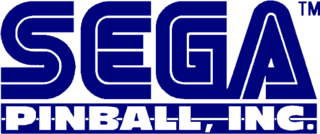Sega Pinball
From Sega Retro

| ||
| Sega Pinball | ||
|---|---|---|
| Founded: 1994 | ||
| Defunct: 1999-10-01 | ||
Headquarters:
|
Sega Pinball Inc. was a division of Sega which produced digital pinball tables during the 1990s.
Contents
History
Sega Pinball's roots can be traced back to the establishment of the Illinois-based Chicago Dynamic Industries in 1931. Trading as Chicago Coin, it produced pinball tables (and later video games) for 45 years until financial troubles caused the division to be sold to Sam Stern in 1977. The newly formed Stern Electronics continued in its place until 1987, where it was aquired by Data East and became Data East Pinball Inc.. Data East, itself engulfed in financial problems in the early 1990s, subsequently sold the division to Sega for ¥3,500,000,000[1], becoming Sega Pinball in 1994.
Sega Pinball was not Sega's first foray in the pinball market; the company had imported and produced its own pinball tables throughout the 1970s (predominantly for Japanese audiences), but had abandoned its ambitions in favour of the growing market of video games. Aside from both producing pinball machines, the US-based Sega Pinball shared nothing with its older Japanese counterpart, and aside from a branding change, was essentially the same division it had been since the days of Stern Electronics, still being run by the Stern family (though Sam Stern's son, Gary was now in charge).
In addition to producing pinball tables, Sega Pinball was tasked with producing arcade redemption games, the idea being that as both are, to some degree, mechanical, it made sense for Sega Pinball to manufacture these rpdocuts rather than Sega Enterprises USA. SEU would still market and distribute Sega Pinball's redemption offerings, however.
When Sega bought the pinball division, Data East held roughly 25% of the pinball market, with most of the remaining 75% belonging to Williams Electronics Games. While pinball had seen a resurgence in the early 1990s, the long-term trend was that of decline, and by 1997 Sega Pinball was one of only two pinball manufacturers remaining. Sega's own downscaling in the late 1990s saw the divison and its assets sold to Gary Stern, who formed Stern Pinball. Williams ceased trading as a pinball company in 1999, leaving Stern as the sole remaining (big) manufacturer of pinball tables until 2013. However, it remains to this day, the largest and most experienced of all pinball manufacturers.
The decline of pinball is generally associated with the rise in interactive video games, and the relatively high maintenance costs that come with running mechanical entertainment machines. Sega, like Data East before it, would attempt to offset the costs by producing tables based on film and TV licenses to attract potential customers, however even with this boost, by the end of the decade it was rare to see more than a few thousand units sold per table. Sega Pinball also produced non-pinball arcade systems, but most are thought to have been sold in even smaller numbers.
Today, all of Sega Pinball's assets belong to Stern Pinball, which also took on maintenance duties when Sega pulled out of the market. Most of the Sega Pinball library was discontinued after the switch, however Harley-Davidson has been through two subsequent production runs (in 2002 and 2004, respectively), and others such as Starship Troopers and Mary Shelley's Frankenstein were included in the 2012 video game, The Pinball Arcade (albeit with Sega-branding removed). Sega is not thought to own any part of its former business.
Sega Pinball's phone number was, quite appropriately, 1-800-KICKERS.
Softography
Redemption game
- (1996)
- (1997)
- (1997)
- (1998)
- (199x)
Digital pinball
- (1995)
- (1995)
- (1995)
- (1996)
- (1996)
- (1996)
- (1997)
- (1997)
- (1997)
- (1997)
- (1997)
- (1998)
- (1998)
- (1998)
- (1998)
- (1999)
- (1999)
Pinball
- Batman Forever (1995)
- Maverick (1994)
Prototypes
- Derby Daze (1996)
- Roach Racers (1997)